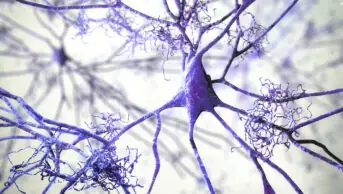
Shutterstock.com
A study of data from nearly 175,000 patients has revealed an association between the use of antipsychotic drugs in patients aged 50 years and older with dementia and increased risk of several adverse drug reactions, including pneumonia, acute kidney injury (AKI), venous thromboembolism (VTE), stroke, fracture, myocardial infarction (MI) and heart failure.
The population-based matched, cohort study — published on 17 April 2024 in BMJ — used anonymised electronic health record data from the Clinical Practice Research Datalink. This included 173,910 adults from GP practices across the UK who were diagnosed with dementia between 1 January 1998 and 31 May 2018.
Each patient who used antipsychotics on or after the date of their first dementia diagnosis was matched with up to 15 randomly selected patients who had the same date of first dementia diagnosis (or up to 56 days after) and who had not been prescribed an antipsychotic before diagnosis.
Patients were followed up from the date of their first antipsychotic prescription until death or until the patient moved out of the GP practice.
Both typical and atypical antipsychotics were included in the trial, including haloperidol, risperidone and quetiapine, and other antipsychotics as a combined category.
Researchers found that, compared with non-use, current use of any antipsychotic — defined as the first 90 days from the date of prescribing an antipsychotic — was associated with increased risk of pneumonia (hazard ratio [HR] 2.19), AKI (HR 1.72), VTE (HR 1.62), stroke (HR 1.61), fracture (HR 1.43), MI (HR 1.28) and heart failure (HR 1.27).
Commenting on the study, Delia Bishara, consultant pharmacist at South London and Maudsley NHS Foundation Trust, said: “This is an important paper that has significant implications.
“For the last 20 years, we have focused on the increased risk of stroke and mortality associated with the use of antipsychotics in people with dementia.
“This study has highlighted a considerable wider range of harms associated with these agents, some we were aware of (VTE and MI), others less so (AKI). However, all these potential harms should be considered when weighing the risks against the benefits of using an antipsychotic in an individual with dementia.
“The implications of these findings could alter the risk/benefit balance in some patients and further enhance the appropriate use of antipsychotics in people with dementia,” she added.
In the UK, only two antipsychotics — risperidone and haloperidol — are licensed for the treatment of non-cognitive symptoms of dementia.
Other treatments options, such as acetylcholinesterase inhibitors and memantine, are available for treatment of Alzheimer’s disease and are commonly used off label in non-Alzheimer’s dementia.
Commenting on the study, Sheona Scales, director of research at Alzheimer’s Research UK, said: “This study reinforces existing evidence about the risks of prescribing antipsychotics to help people with dementia manage their symptoms.
“These concerns have been known for some time … however, these new findings suggest that these risks may be more severe than previously understood, which is particularly concerning given the rise in their use during the pandemic,” she stated.
“With nearly 1 million people affected by dementia in the UK, there is an urgent need for research to develop safer and more effective treatments.”


